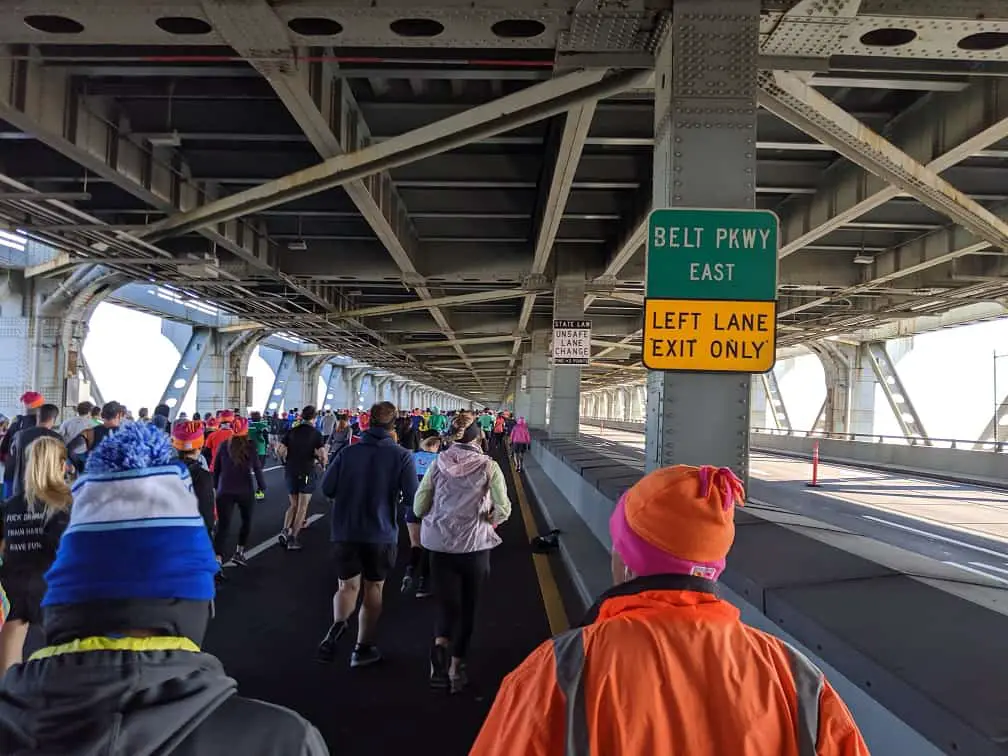From improved performance to protection from the elements, arm sleeves have become a staple accessory for runners everywhere.
Let’s dive in and answer the question of why do marathon runners wear arm sleeves and find out if you should consider adding them to your running gear arsenal.
Table of Contents
Do Arm Sleeves Help You Run Faster?
There is no conclusive evidence that arm sleeves directly help runners run faster.
However, some runners believe that arm sleeves provide improved blood flow and body temperature regulation could lead to better performance. Overall, while arm sleeves may have some benefits, it is unlikely that they will directly make you run faster.
What Is The Science Behind Compression Sleeves?
Compression sleeves work by applying pressure to the muscles and veins in the arms. This pressure helps to improve blood flow and oxygen delivery to the muscles, which can help reduce muscle fatigue and soreness during and after exercise.
Additionally, compression sleeves can help reduce swelling and inflammation by preventing excess fluid buildup in the arms.
Graduated compression, which is tighter near the wrist and looser near the upper arm, is believed to be the most effective form of compression for improving blood flow.
While the science behind compression sleeves is still being studied, many athletes and fitness enthusiasts swear by their benefits for improving performance and aiding recovery.
Should I Wear Calf Sleeves For A Marathon?
Whether or not you should wear calf sleeves for a marathon is a personal decision that depends on your individual needs and preferences.
Calf sleeves can help improve blood flow and reduce muscle fatigue and soreness during and after exercise, which may benefit some runners. However, they may only be necessary for some runners and may provide significant benefits for some runners.
It is essential to try out calf sleeves during training runs to see if they work for you and if they provide any noticeable benefits. Ultimately, choosing to wear calf sleeves for a marathon should be based on your experience and comfort level.
Do Marathon Runners Wear Arm Sleeves After A Marathon?
Some marathon runners wear arm sleeves after a marathon as part of their recovery routine.
Arm sleeves can help improve blood flow and reduce inflammation, aiding muscle recovery. Additionally, arm sleeves can help keep the arms warm and prevent soreness and stiffness from setting in.
However, whether or not to wear arm sleeves after a marathon is a personal decision that depends on individual needs and preferences. Some runners may prefer other recovery methods such as stretching, foam rolling, or ice baths. Listening to your body and choosing the best recovery methods is essential.
What Are The Disadvantages Of Compression Sleeves?
While compression sleeves can provide many benefits for athletes and fitness enthusiasts, there are also some potential disadvantages.
One common disadvantage is that compression sleeves can be uncomfortable or restrictive, especially if they are too tight or not correctly fitted.
Some people may also experience skin irritation or chafing from wearing compression sleeves, particularly if they wear them for long periods. Additionally, compression sleeves may not be suitable for everyone, particularly those with certain medical conditions such as peripheral artery disease or diabetes.
It is essential to consult with a healthcare professional before using compression sleeves if you have any underlying medical conditions.
How Tight Should Arm Compression Sleeves Be?
Arm compression sleeves should be snug but not too tight. They should fit comfortably and allow for a full range of motion.
If the sleeves are too tight, they can restrict blood flow and cause discomfort or pain. On the other hand, if the sleeves are tight enough, they may not provide the benefits of compression and may slip down during exercise.
Some experts recommend choosing arm sleeves one size smaller than your regular size to ensure a snug fit. It’s essential to try on different sizes and brands to find the right fit for your individual needs and preferences.
How To Choose Arm Sleeves For Marathon Training?
When choosing arm sleeves for marathon training, there are several factors to consider:
Material: Look for arm sleeves made from breathable, moisture-wicking polyester or nylon. Avoid cotton, as it tends to hold onto moisture and can cause chafing.
Fit: Make sure to choose arm sleeves that fit snugly but not too tightly. They should be comfortable and allow for a full range of motion.
Compression level: If you’re looking for the benefits of compression, choose arm sleeves with graduated compression that is tighter near the wrist and looser near the upper arm.
UV protection: If you are running in sunny conditions, look for arm sleeves with built-in UV protection to help protect your skin from sun damage.
Reflective details: If you are running in low-light conditions, look for arm sleeves with reflective details to help improve visibility and keep you safe.
Brand and price: Choose a reputable brand that offers quality arm sleeves at a reasonable price.
Considering these factors, you can choose arm sleeves that provide the right combination of comfort, performance, and protection for your marathon training.

Final Thoughts
Marathon runners wear arm sleeves for various reasons, including muscle compression and swelling prevention, body temperature regulation, night visibility, and style.
Research suggests that arm sleeves may have a minimal impact on performance and recovery.
However, they can still provide benefits such as stabilizing arm muscles, increasing blood flow, and reducing muscle vibration.
While arm sleeves may not be necessary for all runners, they can be a helpful tool for those looking to improve their performance and recovery.
Choosing arm sleeves that fit correctly and provide the right amount of compression for your needs is essential.
Additionally, arm sleeves should be worn with other proper running gear, such as appropriate shoes and clothing, to ensure a safe and comfortable running experience.
If you’re considering wearing arm sleeves for your next marathon or long-distance run, be sure to do your research and choose a high-quality product from a reputable brand.
With the right gear and preparation, you can take your running to the next level and achieve your goals.
Frequently Asked Questions
Do Arm Sleeves Really Help With Muscle Fatigue And Soreness?
Arm sleeves can help with muscle fatigue and soreness by improving blood flow and oxygen delivery to the muscles.
The pressure from the compression can also help reduce muscle vibration and damage during exercise, leading to less soreness and fatigue after the workout. However, the extent to which arm sleeves can help with muscle fatigue and soreness may vary from person to person, and the benefits may not be significant for everyone.
It’s essential to try out arm sleeves during training runs to see if they work for you and if they provide any noticeable benefits.
Can I wear arm sleeves in all weather conditions?
Arm sleeves can be worn in various weather conditions, but their effectiveness and comfort may vary depending on the temperature and humidity.
In cooler weather, arm sleeves can help keep the arms warm and prevent muscle stiffness and soreness. In hot weather, arm sleeves can help wick away sweat and provide some protection from the sun. However, wearing arm sleeves may cause discomfort or overheating if the weather is very hot and humid.
It’s essential to choose arm sleeves made from breathable, moisture-wicking materials and to stay hydrated during exercise in hot weather. Overall, arm sleeves can be a valuable accessory for runners and athletes in various weather conditions.
Still, it’s essential to consider the temperature and humidity levels and to choose the right type of arm sleeves for the conditions.
What types of compression wear are available?
There are several types of compression wear available for athletes and fitness enthusiasts, including:
Compression socks: These are designed to improve circulation in the legs and feet and can benefit runners, hikers, and anyone who spends much time on their feet.
Compression sleeves: These can be worn on the arms or legs and provide muscle support and compression. They can benefit runners, weightlifters, and basketball players, among others.
Compression shorts: These are designed to compress the muscles in the hips, thighs, and glutes. They can benefit runners, cyclists, and anyone who engages in lower-body exercises.
Compression tops: These are designed to provide compression to the upper body and can benefit athletes who engage in activities such as weightlifting, basketball, or swimming.
Compression tights: These are designed to provide compression to the entire lower body and can benefit runners, cyclists, and anyone who engages in lower-body exercises.
Overall, the type of compression wear you choose will depend on your individual needs and the activity you’ll be doing. Choosing compression wear that fits properly and provides the right compression level for your individual needs is essential.
Can I Wear Arm Sleeves For Other Types Of Exercise Besides Running?
Yes, arm sleeves can be worn for other exercise besides running.
They can provide benefits such as improved blood flow, muscle support, and temperature regulation for various activities, including cycling, weightlifting, and basketball. Additionally, arm sleeves can be worn during recovery periods to aid muscle recovery and reduce inflammation.
However, it’s essential to choose arm sleeves that are appropriate for the specific activity you’ll be doing. For example, if you are cycling, choose arm sleeves with a more aerodynamic design.
Do Arm Sleeves Really Help With Muscle Fatigue And Soreness?
Arm sleeves can help with muscle fatigue and soreness by improving blood flow and oxygen delivery to the muscles. The pressure from the compression can also help reduce muscle vibration and damage during exercise, leading to less soreness and fatigue after the workout.
However, the extent to which arm sleeves can help with muscle fatigue and soreness may vary from person to person, and the benefits may be insignificant for some. It’s essential to try out arm sleeves during training runs to see if they work for you and if they provide any noticeable benefits.

